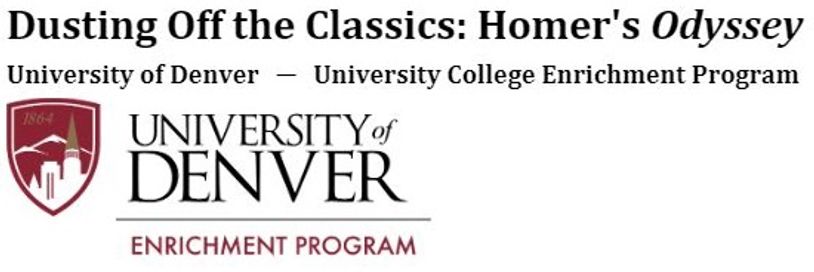Richard Sacks
life-long explorations of great works of literature

University College Enrichment Program
Fall 2020 Enrichment Program Catalog
Richard Sacks -- Fall 2020 (two sections)
Five-session course
Online (via Zoom) with class size limited to 23
For a note on translations, see below
Section #1: Monday evenings, 6:30-8:30pm MDT
November 9, 16, 23, 30, December 7
Course materials and info page for section #1
Section #2: Tuesday evenings, 6:30-8:30pm MDT
December 8, 15, 22, January 5, 12
Course materials and info page for section #2
For nearly 3000 years, Homer's Odyssey has challenged generation after generation to wrestle with fundamental questions about what it takes – and whether it is even possible – to go out into the wide world and then return home to live in happiness and peace. But what is it about this most enduring of ancient classics that continues to speak to us today? Join Professor Richard Sacks, who spent four decades at Columbia University teaching ancient texts such as the Iliad, Odyssey, Aeneid, Beowulf and Genesis, in an exploration of this remarkable poem about the famed but troubled and troubling Greek hero Odysseus as he tries to move from his war-torn experiences at Troy through a startling array of often unimaginable landscapes – in this world and beyond, filled with everything from gods to monsters – until he finally returns to the very human world of his home and family on his modest and beloved island of Ithaka. But can we ever truly process the horrors of war? Can we ever understand things that are deeply foreign to our own experience and knowledge? And is there a fundamental tension between what we must become to get back home and what we must be to genuinely and successfully inhabit home? These are the kinds of profound and haunting questions the Odyssey will ask us to consider as we take our own journey through this astonishing poem.
Note on Translations
I will be using the 1965 translation of Richmond Lattimore (current edition published by Harper-Collins, ISBN 978-0061244186). But students are welcome to use the translation of their choice, keeping in mind that choosing a translation often involves a difficult set of trade-offs when it comes to readability, accuracy, and the inevitability of a translator's interpretive prejudice. Certainly Lattimore's translation is not the most beautiful or exciting one, but by and large it comes closest to the original Greek without crossing the line into unreadability or interpretive prejudice. It also corresponds very closely to the line numbers in the Greek text (as does the new Emily Wilson translation), a feature which makes things much easier when it comes to finding one's place in the text and taking advantage of powerful online tools for analysis.
Copyright © 2021 Richard Sacks - All Rights Reserved.
Powered by GoDaddy Website Builder